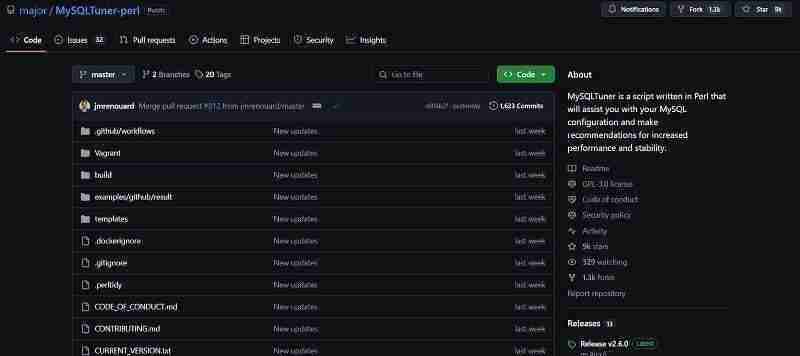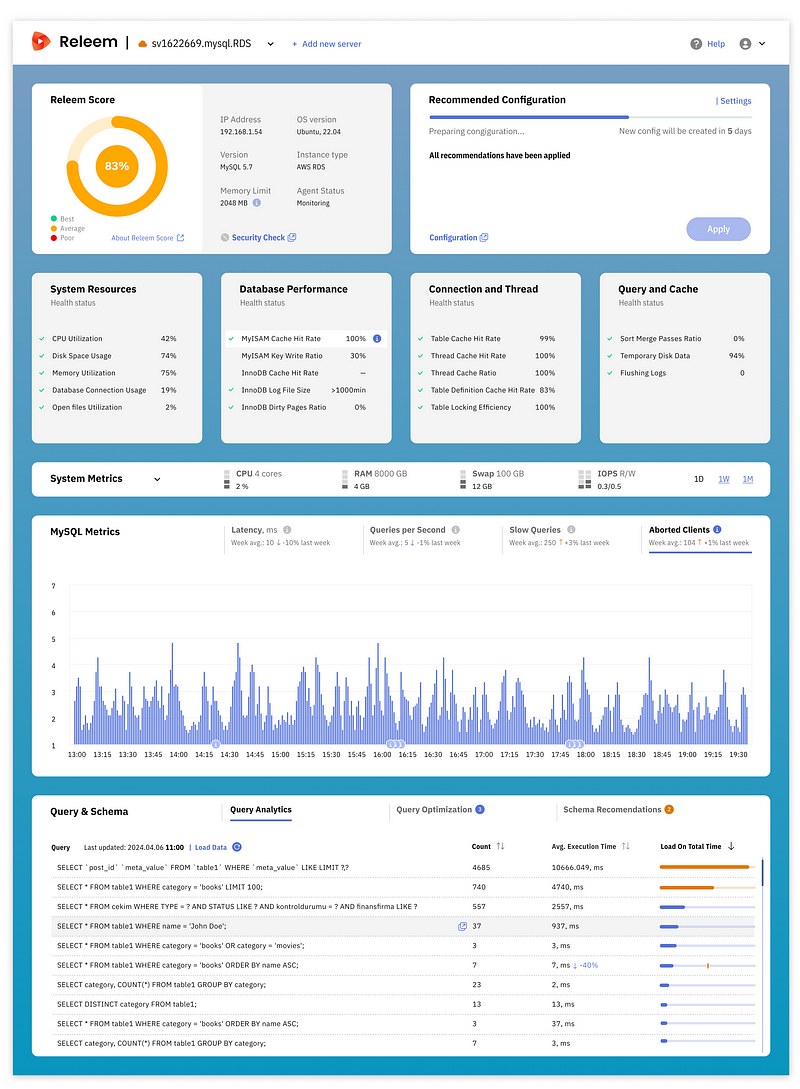MySQLTuner for Windows: FAQs and Better Alternatives
MySQL database performance tuning under Windows system: Say goodbye to MySQLTuner and embrace Releem
If you have tried to optimize MySQL database performance with MySQLTuner on Windows systems, you may have encountered some challenges. Although MySQLTuner can analyze performance issues of MySQL, MariaDB, and Percona Server, its application in Windows environments has many limitations. This article will explore these challenges and recommend a better solution - Releem.
Introduction to MySQLTuner
MySQLTuner is a Perl script designed to diagnose and provide recommendations for improving the performance of MySQL databases. It quickly identifies server performance bottlenecks such as memory utilization, hit rate, and connection statistics by connecting to database servers, collecting key performance metrics and analyzing server configurations. Based on the analysis results, MySQLTuner will give corresponding adjustment suggestions, such as adjusting the buffer size and cache settings. However, effective implementation of these recommendations requires solid knowledge of database management.
Four major challenges in using MySQLTuner on Windows systems
Running MySQLTuner in a Windows environment may face the following challenges:
System Metrics Collection Issues: MySQLTuner is best suited to run on Linux systems because it relies on Linux system commands such as
free,vmstat, anduptimeto collect system metrics. These commands do not exist in Windows systems, making it difficult for MySQLTuner to collect necessary system information, thereby reducing tuning efficiency. Although tools such as Cygwin can be used to simulate Linux environments, this increases setup complexity.Perl dependencies: MySQLTuner is a Perl script that requires the installation of Perl interpreter and necessary Perl modules (such as DBI and DBD::mysql) on Windows systems, which may be a barrier for users who are not familiar with Perl.
Incomplete or misleading advice: Since MySQLTuner is designed primarily for Linux systems, its advice may not apply to Windows environments and may even lead to degradation in database performance. For example, suggestions for InnoDB buffer pool size and query cache can vary widely between operating systems.
Poor user experience: The above problems will seriously affect the user experience of Windows users. Complex installation procedures, inaccurate suggestions, and compatibility issues with Windows systems make MySQLTuner inefficient and infriendly on Windows systems.
Alternatives to MySQLTuner for Windows
Given the many limitations of MySQLTuner on Windows systems, we recommend the following alternatives:
- MySQLTuner for the pmachapman branch: pmachapman modified the original MySQLTuner to better integrate with Windows systems, providing more accurate tuning suggestions by using alternative commands and tools to collect system metrics.

- Releem: Releem is a professional database performance optimization tool that does not require relying on the underlying operating system to collect data and provide suggestions, so it can run efficiently on various operating systems such as Windows and Linux.

Advantages of Releem
Releem's performance on Windows systems is much better than MySQLTuner, which is mainly reflected in the following aspects:
- Automation: Releem automates the entire performance tuning process, from data collection to analysis and optimization implementation without manual intervention.
- Ease of use: Releem provides an intuitive interface without complex Perl installation and configuration.
- Accuracy: Releem uses advanced algorithms to dynamically adapt to the operating conditions of the database, providing more accurate and effective tuning suggestions.
- Real-time monitoring: Releem provides real-time monitoring functions to facilitate users to understand the database health status at any time.
- Automatic rollback: Releem provides automatic rollback function to prevent database interruption due to incorrect configuration.
- SQL Query Optimization: Releem automatically recognizes and optimizes inefficient SQL queries, and recommends improvements and indexing solutions.
- Continuous Optimization: Releem continues to adapt to the ever-changing needs of the database and provides continuous optimization.
in conclusion
Releem is a better choice for performance tuning of MySQL databases under Windows systems. It is easier to use, more accurate, more automated than MySQLTuner, and provides more comprehensive performance optimization capabilities. If you want to easily improve MySQL database performance, it is highly recommended that you try Releem.
The above is the detailed content of MySQLTuner for Windows: FAQs and Better Alternatives. For more information, please follow other related articles on the PHP Chinese website!

Hot AI Tools

Undresser.AI Undress
AI-powered app for creating realistic nude photos

AI Clothes Remover
Online AI tool for removing clothes from photos.

Undress AI Tool
Undress images for free

Clothoff.io
AI clothes remover

Video Face Swap
Swap faces in any video effortlessly with our completely free AI face swap tool!

Hot Article

Hot Tools

Notepad++7.3.1
Easy-to-use and free code editor

SublimeText3 Chinese version
Chinese version, very easy to use

Zend Studio 13.0.1
Powerful PHP integrated development environment

Dreamweaver CS6
Visual web development tools

SublimeText3 Mac version
God-level code editing software (SublimeText3)

Hot Topics
 How to understand ABI compatibility in C?
Apr 28, 2025 pm 10:12 PM
How to understand ABI compatibility in C?
Apr 28, 2025 pm 10:12 PM
ABI compatibility in C refers to whether binary code generated by different compilers or versions can be compatible without recompilation. 1. Function calling conventions, 2. Name modification, 3. Virtual function table layout, 4. Structure and class layout are the main aspects involved.
 How to optimize code
Apr 28, 2025 pm 10:27 PM
How to optimize code
Apr 28, 2025 pm 10:27 PM
C code optimization can be achieved through the following strategies: 1. Manually manage memory for optimization use; 2. Write code that complies with compiler optimization rules; 3. Select appropriate algorithms and data structures; 4. Use inline functions to reduce call overhead; 5. Apply template metaprogramming to optimize at compile time; 6. Avoid unnecessary copying, use moving semantics and reference parameters; 7. Use const correctly to help compiler optimization; 8. Select appropriate data structures, such as std::vector.
 Ouyi official website entrance Ouyi official latest entrance 2025
Apr 28, 2025 pm 07:48 PM
Ouyi official website entrance Ouyi official latest entrance 2025
Apr 28, 2025 pm 07:48 PM
Choose a reliable trading platform such as OKEx to ensure access to the official entrance.
 How to understand DMA operations in C?
Apr 28, 2025 pm 10:09 PM
How to understand DMA operations in C?
Apr 28, 2025 pm 10:09 PM
DMA in C refers to DirectMemoryAccess, a direct memory access technology, allowing hardware devices to directly transmit data to memory without CPU intervention. 1) DMA operation is highly dependent on hardware devices and drivers, and the implementation method varies from system to system. 2) Direct access to memory may bring security risks, and the correctness and security of the code must be ensured. 3) DMA can improve performance, but improper use may lead to degradation of system performance. Through practice and learning, we can master the skills of using DMA and maximize its effectiveness in scenarios such as high-speed data transmission and real-time signal processing.
 What is real-time operating system programming in C?
Apr 28, 2025 pm 10:15 PM
What is real-time operating system programming in C?
Apr 28, 2025 pm 10:15 PM
C performs well in real-time operating system (RTOS) programming, providing efficient execution efficiency and precise time management. 1) C Meet the needs of RTOS through direct operation of hardware resources and efficient memory management. 2) Using object-oriented features, C can design a flexible task scheduling system. 3) C supports efficient interrupt processing, but dynamic memory allocation and exception processing must be avoided to ensure real-time. 4) Template programming and inline functions help in performance optimization. 5) In practical applications, C can be used to implement an efficient logging system.
 How to implement loosely coupled design in C?
Apr 28, 2025 pm 09:42 PM
How to implement loosely coupled design in C?
Apr 28, 2025 pm 09:42 PM
To implement loose coupling design in C, you can use the following methods: 1. Use interfaces, such as defining the Logger interface and implementing FileLogger and ConsoleLogger; 2. Dependency injection, such as the DataAccess class receives Database pointers through the constructor; 3. Observer mode, such as the Subject class notifies ConcreteObserver and AnotherObserver. Through these technologies, dependencies between modules can be reduced and code maintainability and flexibility can be improved.
 An efficient way to batch insert data in MySQL
Apr 29, 2025 pm 04:18 PM
An efficient way to batch insert data in MySQL
Apr 29, 2025 pm 04:18 PM
Efficient methods for batch inserting data in MySQL include: 1. Using INSERTINTO...VALUES syntax, 2. Using LOADDATAINFILE command, 3. Using transaction processing, 4. Adjust batch size, 5. Disable indexing, 6. Using INSERTIGNORE or INSERT...ONDUPLICATEKEYUPDATE, these methods can significantly improve database operation efficiency.
 Top 10 commonly used cryptocurrency trading software rankings in 2025
Apr 28, 2025 pm 05:45 PM
Top 10 commonly used cryptocurrency trading software rankings in 2025
Apr 28, 2025 pm 05:45 PM
The top ten cryptocurrency trading software rankings in 2025 include Binance, OKX, gate.io, etc., all of which provide a variety of trading models and rigorous security measures.






